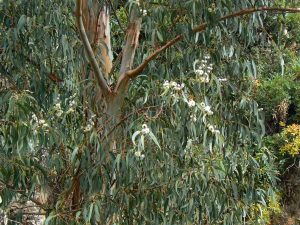Liz Seal Holistic Massage
 Eucalyptus is an evergreen tree which grows up to a height of 100m with leathery, pale green/blue leaves and small white flowers. There are over 700 varieties of Eucalyptus, with around 500 producing aromatic essential oil. This family of oils has been distilled since around 1788, when 2 Australian doctors used the oil for treating chest problems and colic. The Blue mountains of New South Wales are so called because there is a blue haze that envelops the landscape. This is caused by the density of Eucalyptus trees which grow in this area and exude their aromatic resin into the air. In this powerfully aromatic environment the medicinal qualities of this ancient tree would be hard to miss.
Eucalyptus is an evergreen tree which grows up to a height of 100m with leathery, pale green/blue leaves and small white flowers. There are over 700 varieties of Eucalyptus, with around 500 producing aromatic essential oil. This family of oils has been distilled since around 1788, when 2 Australian doctors used the oil for treating chest problems and colic. The Blue mountains of New South Wales are so called because there is a blue haze that envelops the landscape. This is caused by the density of Eucalyptus trees which grow in this area and exude their aromatic resin into the air. In this powerfully aromatic environment the medicinal qualities of this ancient tree would be hard to miss.
The oils from the Myrtaceae family, which includes the Eucalyptus and Tea Tree oils, are marvellously versatile, being anti-inflammatory, antiseptic, antibiotic and analgesic. Most Eucalyptus oils are widely used for coughs and colds, respiratory conditions, and viral infections, while also being useful for cystitis and other genito-urinary conditions. In combination with other oils (such as Tea Tree and Common Thyme) Eucalyptus oil will act as an immune system tonic, helping to prevent the reoccurrence of infection.
 Eucalyptus smithii is one of the best-known oils, being a component in many respiratory treatments (including Olbas Oil, and my Breathe Well diffuser blend). Eucalyptus globulus is very similar chemically and both of these oils are quite strong in aroma and action. Eucalyptus radiata is softer and more gentle in aroma. Eucalyptus citriadora is lemon-scented which may be preferred by children and the mentally or physically fragile as it has a sweeter, citrus fragrance. Eucalyptus staigeriana (also known as Lemon Ironbark) has a fresh, citrus aroma and is very gentle, while uplifting and stimulating for the immune system.
Eucalyptus smithii is one of the best-known oils, being a component in many respiratory treatments (including Olbas Oil, and my Breathe Well diffuser blend). Eucalyptus globulus is very similar chemically and both of these oils are quite strong in aroma and action. Eucalyptus radiata is softer and more gentle in aroma. Eucalyptus citriadora is lemon-scented which may be preferred by children and the mentally or physically fragile as it has a sweeter, citrus fragrance. Eucalyptus staigeriana (also known as Lemon Ironbark) has a fresh, citrus aroma and is very gentle, while uplifting and stimulating for the immune system.
The eucalyptus family of oils are one of the best loved and most used in the aromatherapist’s tool box, and one of these oils would be a useful addition to any family medicine cabinet. The oil should always be used diluted when applied to the skin unless advised by a qualified aromatherapist. These oils are also useful when used for inhalation. To cleanse and freshen the air in our homes these fresh and anti-infectious oils can be added to a diffuser or burner. Use on a tissue to gently open the airways and relieve respiratory congestion.
For further information or for an in-depth consultation on the oils most suited for you, please contact me.